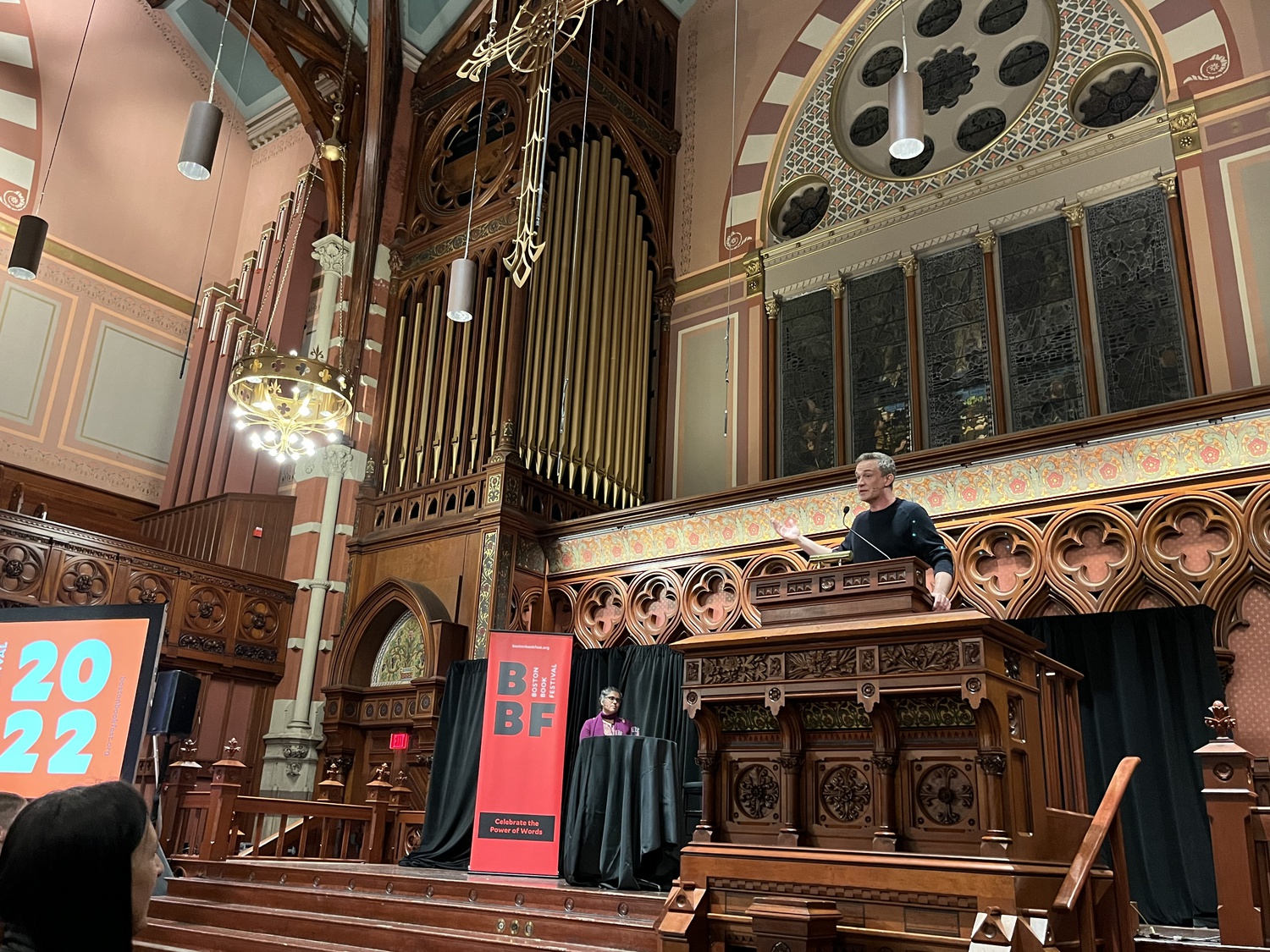
News
HMS Is Facing a Deficit. Under Trump, Some Fear It May Get Worse.

News
Cambridge Police Respond to Three Armed Robberies Over Holiday Weekend

News
What’s Next for Harvard’s Legacy of Slavery Initiative?

News
MassDOT Adds Unpopular Train Layover to Allston I-90 Project in Sudden Reversal

News
Denied Winter Campus Housing, International Students Scramble to Find Alternative Options
From the Boston Book Festival: Patrick Radden Keefe on Storytelling and Morality

Dozens of book lovers filled up the pews in the Old South Church in Copley Square on Friday, October 28, to attend a talk by author, journalist, and headliner of the Boston Book Festival Patrick Radden Keefe.
Keefe is a writer for the New Yorker and the author of several best-selling books, including “Empire of Pain” (2021) and “Say Nothing” (2018). At the talk in the Old South Church, he focused mostly on his new book, “Rogue: True Stories of Grifters, Killers, Rebels and Crooks,” an anthology of twelve stories of Keefe’s published over the last decade in the New Yorker.
At the start of the event, Deborah Z. Porter, founder of the Boston Book Festival, welcomed the Festival’s first in-person audience since 2019 and introduced Keefe onto the stage.
“It feels a little like the first one ever, where we don't really know what's going to happen,” Porter said about the planning of the event.
Keefe described himself as a “writer who likes to borrow from fiction, but tell true stories.” His talk, his advice, his reasoning — they were all given in the form of stories. He began by talking about the writing of one of the pieces in his book about the Mexican drug lord El Chapo. According to Keefe, after he wrote this story, he got a call from one of El Chapo's lawyers, asking Keefe if he would ghostwrite El Chapo's autobiography. Keefe declined, worried it may put him into a dangerous situation given El Chapo’s violent history.
These stories seemed to keep the audience fully engaged. The talk was humorous and enlightening at the same time.
“It’s nice to hear people who are funny and personable, but they talk about craft,” Sarah L. Lee ’99 said. Lee knew about Keefe from his previous works, and is also a big fan of the Boston Book Festival. She has been a consistent attendee since 2013.
Keefe was interviewed for part of the event by Meghna Chakrabarti, host of NPR’s “On Point.” She asked about his choice of title, his reasoning for publishing the collection, his observation skills, and what moments he looks for to develop the characters in his stories.
“It's fun to see both Keefe and Meghna in person when I’m so used to hearing their voices,“ audience member Zoe R. Weinrobe said, referring to Keefe’s podcast “Wind of Change” and Chakrabarti’s radio hosting.
One of Keefe’s main points throughout his talk and in his writing was his attempt to see even the worst people as multi-dimensional humans. To explain this belief, he offered a story about a death row lawyer he met through reporting. This lawyer, he said, agreed to work with only the worst of the worst cases, representing the defendant in the Boston Marathon bombing, for instance.
“So it's one of her articles of faith that we aren’t born evil, that none of us are born evil, things happen to us along the way. And I don't know that I would take it to the extreme that she does,” he said, “but as a writer, I'm most interested in how people can deviate from conventional morality, how it happens by degree and then the stories that they tell themselves about what they're doing.”
His books, he says, come from stories he wrote for the New Yorker that still feel incomplete at a length of 10,000 words. For example, his true crime book “The Snakehead'' is about a woman who smuggled people into the United States from China, then was arrested by the FBI.
Porter said that Keefe was chosen by the nonfiction committee for the Boston Book Festival because of the release of “Rogue,” his most recent book. When they suggested the idea to her, she didn’t believe that they would be able to get him to speak — but she reached out to his publishers and made it work.
“It was very exciting,” she said.
Keefe has ties to the Boston area too: He was raised in Dorchester. He said growing up in Boston helped him learn how to connect with the people he reports on and gain their trust.
“I do think that Boston's kind of weird mix of different cultures, the fusty blue blooded culture and the academic culture, the blue collar culture, and the immigrant cultures, all kinds of money together,” he said. “I like to think that that equipped me to just move through the world and try to find common ground with strangers everyday.”
Want to keep up with breaking news? Subscribe to our email newsletter.
